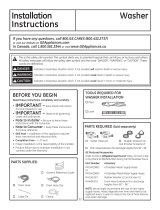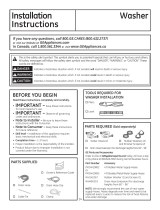
Installation
Instructions
Full Size Automatic Washer
Before beginning installation, carefully read these instructions. This will simplify the
installation and ensure the washer is installed correctly and safely. Leave these instructions
near the washer after installation for future reference.
NOTE: The electrical service to the washer must conform with local codes and ordinances
and the latest edition of the National Electrical Code, ANSI/NFPA 70.
Contents
SUBJECT PAGE
Pre-lnstallation Requirements 2
Electrical Requirements 2
Grounding Requirements 2
Water Supply Requirements 2
Drain Requirements 2
Rough-In Dimensions 3
Location 3
Unpacking 3
Installation 3-4
Replacement Parts 4
Printed in U.S.A. P/N 131457800 (9506)

PRE-INSTALLATION REQUIREMENTS
Tools Required for Installation:
1. 3/8 in. socket with ratchet.
2. Channel-lock adjustable pliers.
3. Carpenter's level.
ELECTRICAL REQUIREMENTS
CIRCUIT - Individual, properly polarized and grounded
15 amp. branch circuit fused with 15 amp. time delay
fuse or circuit breaker.
POWER SUPPLY - 2 wire, with ground, 120 volt, single
phase, 60 Hz, Alternating Current.
OUTLET RECEPTACLE - Properly grounded 3-prong
receptacle to be located so the power supply cord is
accessible when the washer is in an installed position.
GROUNDING REQUIREMENTS
Improper connection of the equipment
grounding conductor can result in a risk of electrical
shock. Check with a licensed electrician if you are in
doubt as to whether the appliance is properly grounded.
1.
The washer MUST be grounded. In the event of a
malfunction or breakdown, grounding wilt reduce
the risk of electrical shock by a path of least
resistance for electrical current.
2.
licensed electrician. DO
NOT cut off or alter the
grounding prong on the
power supply cord. In
situations where a two-
slot receptacle ispresent,
Since your washer is equipped with a power supply
cord having an equipment-grounding conductor and
a grounding plug, the plug MUST be plugged into
an appropriate, copper wired receptacle that is
properly installed and grounded in accordance with
all local codes and ordinances or in the absence of
local codes, with the National Electrical Codes,
ANSI/NFPA 70 (latest
edition). If in doubt, call a _,_!_=_
DfD,, not under
any oir¢_l_lStatlces
cut, remove,
or bypass
e g_Oundi_g p_ong
_ :_cJndi_g plu_
it is the owner's responsi-
bility to have a licensed electrician replace it with a
properly grounded three prong grounding type
receptacle.
3.
For added personal safety, connect a separate
ground wire (No. 18 minimum) from a top panel
hinge screw on the rear of the washer to a grounded
cold water pipe. DO NOT ground to a gas supply
pipe or hot water pipe.
4. Grounded cold water pipe MUST have metal
continuity to electrical ground and MUST register
no more than 25 ohms resistance. It MUST not be
interrupted by plastic, rubber, or other electrical
insulating connectors such as hoses, fittings,
washers, gaskets (including water meter or pump).
Any electrically insulated connector should be
jumped with a length of No. 4 copper wire securely
clamped to bare metal at both ends with a UL
approved ground clamp.
5. If a grounded water pipe is not available, a ground
rod MUST be used and register no more than 25
ohms resistance when in the ground. Drive the rod
into the ground outside the dwelling and connect a
grounding wire (12 AWG or heavier) between the
grounding screw and the grounding rod. It may take
more than one ground rod to not exceed 25 ohms
resistance to ground.
WATER SUPPLY REQUIREMENTS
Hot and cold water faucets MUST be installed within 42
inches (107 cm) of your washer's water inlet. The faucets
MUST be 3/4 inch (1.9 cm) garden hose type so inlet
hoses can be connected. Water pressure MUST be
between 10 and 120 pounds per square inch (maximum
unbalance pressure, hot vs. cold, 10 psi.) Your water
department can advise you of your water pressure. The
hot water temperature should be about 140 degrees F
(60 degrees C).
DRAIN REQUIREMENTS
1. Drain capable of eliminating 17 gallons (64.3 L) per
minute.
2. A standpipe diameter of 1-1/4 in. (3.18 cm) minimum.
3. The standpipe height above the floor should be:
Minimum height: 33 in. (61 cm)
Maximum height: 96 in. (244 cm)
T
1" 96" Max.
33" Min. (244 cm)
(61 cm)
NOTE:
For installations requiring a longer drain hose,
have a qualified technician install a longer
drain hose according to your model number.
For drain systems in the floor, install a syphon
break kit, P/N 5377678100. Both parts are
available from an authorized parts distributor.
2

ROUGH-IN DIMENSIONS
11-7/16"
DRAIN (29,05 cm)
OUTLET _ J
27"_ _ 27"_
(68.58cm) (68,58cm)
FRONT VIEW SIDE VIEW
MECHANISM
SHIPPING
BOLT
PLASTIC
SPACER
BLOCK
SHIPPING BLOCKS
FOAM / \
SHIPPING POWER
PAD CORD
SHIPPING CARTON
CORNER POSTS
DRAIN HOSE
LOCATION OF YOUR WASHER
DO NOT INSTALL YOUR WASHER:
1. In an area exposed to dripping water or outside
weather conditions. The ambient temperature
should never be below 60 degrees F (15.6 degrees
C) for proper washer operation.
2. In an area where it wilt come in contact with curtains
or drapes.
3. In an area (garage or garage-type building) where
gasoline of other flammables are kept or stored
(including automobiles).
4. On carpet. Floor MUST BE SOLID with a maximum
slope of 1 in. (2.54 cm). To ensure vibration or
movement does not occur, REINFORCEMENT of
the floor may be necessary.
IMPORTANT MINIMUM INSTALLATION CLEARANCES
When installed in alcove: Sides = 0" (0 cm),
Rear = 0" (0 cm), Top = 20" (50.8 cm).
When installed in closet: Sides = 0" (0 cm),
Rear = 0" (0 cm), Top = 20" (50.8 cm), Front = 1"
(2.54 cm).
Closet door ventilation openings required: 2 louvers
each 60 square inches (387 cm2)-- 3 inches (7.6 cm)
from bottom and top of door.
1.
2.
UNPACKING
Using the four shipping carton comer posts (two on
each side), carefully lay the washer on its left side
and remove foam shipping base.
Using a ratchet with 3/8" socket, remove the
mechanism shipping bolt and plastic spacer block
from the center of the base.
NOTE: If the washer is to be transported at a later
date, the tub blocking pad, shipping bolt,
and plastic spacer block should be retained.
3. Return the washer to an upright position.
4. Remove the tape holding the lid shut and open the
lid.
.
6.
7.
.
Remove the foam tub blocking pad.
Remove the inlet hoses (some models have inlet
hoses already attached to the water valve) and
enclosure package from the tub.
From the back of the washer, remove the wire
shipping clips securing the drain hose and power
cord. On some models, PLASTIC CLAMPS secure
the drain hose to the right side of the washer
backsheet. These clamps form a standpipe to
prevent water siphoning. DO NOT REMOVE THESE
CLAMPS.
Carefully move the washer to within 4 feet of the
final location for the start of the installation.
1.
2.
.
INSTALLATION
Run some water from the hot and cold faucets to
flush the water lines and remove particles that might
clog up the water valve screens.
Check inlet hoses to ensure that the rubber washers
are installed in each end (If your washer has inlet
hoses already attached to the water valve, proceed
to step 4).
Carefully connect the inlet
hoses to the water valve
(on the left side of the
washer cabinet), tighten by
hand, then tighten another
2/3 turn with pliers.
_ DO NOT
CROSS THREAD OR
OVERTIGHTEN THESE
CONNECTIONS.
3

4.
.
6.
7.
Determine which water faucet is the HOT water
faucet and carefully connect the bottom inlet hose
to the HOT water faucet, tighten by hand, then tighten
another 2/3 turn with pliers. Carefully connect the
top inlet hose to the COLD water faucet, tighten by
hand, then tighten another 2/3 turn with pliers.
DO NOT CROSS THREAD OR
OVERTIGHTEN THESE CONNECTIONS.
Turn the water on and check for leaks at both
connections.
Carefully move the washer to itsfinal location.
To ensure the washer is level and solid on all four
legs, open the lid, grasp the top panel and tilt the
washer forward so the rear legs are off the ground.
Gently set the washer back down to allow the rear
legs to self adjust. Place a level on top of the washer.
Check it side to side, then front to back. Screw the
front leveling legs up or down to ensure the washer
is resting solid on all four legs (no rocking of the
washer should exist).
NOTE: Keep the leg extension at a minimum to
prevent excessive vibration. The farther out
the legs are extended the more the washer
will vibrate.
_CABLE TIE
CABLE TIE
Form a "U" shape on the end of the drain hose with
the hose pointed toward the drain. On some models,
a wire retainer needs to be assembled on the hose
in that position. Place the formed end in a laundry
tub or a standpipe and secure with a cable tie
provided in the enclosure package.
NOTE:
The standpipe inside diameter must be
1-1/4" (3.18 cm) minimum. There must
be an air gap around the drain hose in
the standpipe. A snug hose fit can cause
a siphoning action.
8. Plug the power cord into a grounded outlet.
NOTE: Check to ensure the power is off at a
circuit breaker/fuse box before plugging
the power cord into an outlet.
9. Turn on the power at a circuit breaker/fuse box.
10.
Read the Operating Instructions and Owner's Guide
provided with the washer. They contain valuable and
helpful information that will save you time and
money.
11. Run the washer through a complete cycle. Check
for water leaks and proper operation.
12. If your washer does not operate, please review the
"Avoid Service Checklist" located in your Owner's
Guide before calling for service.
13. Place these instructions in a location near the
washer for future reference.
NOTE: A wiring diagram is located inside the washer
console.
REPLACEMENT PARTS
If replacements parts are needed for your washer,
contact the source where you purchased your washer
or call 1-800-451-7007 for the Frigidaire Company
Authorized Parts Distributor nearest you.
r x'_'*'r-'_'q"H='L_lDestroythe carton and plastic bags after
the washer is unpacked. Children might use them for
play. Cartons covered with rugs, bedspreads, or plastic
sheets can become airtight chambers causing
suffocation. Place all materials in a garbage container
or make materials inaccessible to children.
r; 'L'A'r-'_,I_'H_'L'_The instructions in this manual and all
other literature included with this washer are not meant
to cover every possible condition and situation that may
occur. Good safe practice and caution MUST be applied
when installing, operating and maintaining any appliance.
Maximum benefits and enjoyment are achieved
when all the Safety and Operating instructions are
understood and practiced as a routine with your
laundering tasks.
4
-
 1
1
-
 2
2
-
 3
3
-
 4
4
Ask a question and I''ll find the answer in the document
Finding information in a document is now easier with AI
Related papers
-
Frigidaire GSWS9719AS0 Installation guide
-
Frigidaire CWS3600AS1 Installation guide
-
Crosley GLWS1439FC2 Installation guide
-
Frigidaire GLWS1439FS Installation guide
-
Frigidaire BLTF2940ES0 Installation guide
-
Frigidaire FWS833AS2 Installation guide
-
Frigidaire FTW3014KW0 Installation guide
-
Frigidaire FTW3011K User manual
-
Frigidaire Affinity 7000 Series User manual
-
Frigidaire FLXG52RBSA Installation guide
Other documents
-
White-Westinghouse SWS1649HQ0 Installation guide
-
Kenmore 134966700 User manual
-
Maytag MAH5500BWW - Neptune Series 27'' Front-Load Washer Installation guide
-
Electrolux ELTW20XAKW0 Owner's manual
-
 GE Appliances GTW680BSJWS Installation guide
GE Appliances GTW680BSJWS Installation guide
-
 GE Appliances GTW460ASJWW Installation guide
GE Appliances GTW460ASJWW Installation guide
-
Whirlpool 3358968 User manual
-
Crosley YTW4514PNDG User manual
-
GE GFW650SPNSN Installation guide
-
Whirlpool LTE5243DQ9 Installation guide





